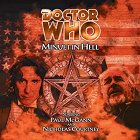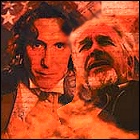 Brigadier Lethbridge-Stewart (Retired) arrives in the newly-formed American state of Malebolgia, where the locals have requested his advice following his participation in the secession of Scotland from the United Kingdom. But the Brigadier is a little suspicious of events in Malebolgia, and he’s not alone – he has actually been assigned to look into rumors of misuse of a mind scanning/recording/reprogramming device at a local mental hospital. Those rumors turn out to be true when the Brigadier encounters a long-haired man in unusual clothes who claims to have arrived out of nowhere only the night before, and also claims to know the Brigadier. But Lethbridge-Stewart takes the man back to the mental hospital, and doesn’t get to hear the man’s claims that he’s a Time Lord from the planet Gallifrey – and another patient at the mental hospital is making precisely the same claims. But whoever the Doctor may be, he’s in no position to stop a confluence of demonic influences from overrunning the 51st state – leaving Lethbridge-Stewart and an equally amnesiac Charley to do battle with darkness by themselves.
Brigadier Lethbridge-Stewart (Retired) arrives in the newly-formed American state of Malebolgia, where the locals have requested his advice following his participation in the secession of Scotland from the United Kingdom. But the Brigadier is a little suspicious of events in Malebolgia, and he’s not alone – he has actually been assigned to look into rumors of misuse of a mind scanning/recording/reprogramming device at a local mental hospital. Those rumors turn out to be true when the Brigadier encounters a long-haired man in unusual clothes who claims to have arrived out of nowhere only the night before, and also claims to know the Brigadier. But Lethbridge-Stewart takes the man back to the mental hospital, and doesn’t get to hear the man’s claims that he’s a Time Lord from the planet Gallifrey – and another patient at the mental hospital is making precisely the same claims. But whoever the Doctor may be, he’s in no position to stop a confluence of demonic influences from overrunning the 51st state – leaving Lethbridge-Stewart and an equally amnesiac Charley to do battle with darkness by themselves.
written by Alan W. Lear with Gary Russell
directed by Nicholas Briggs
music by William AllenCast: Paul McGann (The Doctor), India Fisher (Charley), Nicholas Courtney (Brigadier Lethbridge-Stewart), Robert Jezek (Brigham Elisha Dashwood), Morgan Deare (Senator Waldo Pickering), Helen Goldwyn (Becky Lee), Maureen Oakeley (Doctor Dale Pargeter), Nicholas Briggs (Gideon Crane)
Timeline: after Stones Of Venice and before Invaders From Mars
LogBook entry and TheatEar review by Earl Green
Review: An interesting finale to a quartet of eighth Doctor adventures, Minuet In Hell is a little uneven in places. Unless it’s really warranted – say, like a regeneration story – I’m not really in favor of stories where the Doctor has lost his marbles and becomes a rambling wreck for 75% of the story. The Brigadier makes the absence of the more familiar lead tolerable, but too many things are sprung on us in part four – suddenly, the Brigadier’s instructions have been coming from someone in Britain who seems to have been possessed by demons, the Doctor regains his personality and memories, and various characters’ arcs wrap up rather neatly. A little too tidy, really. And a bit disappointing – the Doctor and the Brigadier ultimately spend very little time in each other’s company fighting the good fight, and that is, after all, what we were all hoping for.
Storywise, I couldn’t help but wonder if spunky, demon-fighting heroine Becky Lee Kowalczyck might not be just a wee bit influenced by a certain Buffy Summers. I was also stunned at the mention of Grace, the eighth Doctor’s first companion who appeared in the 1996 TV movie; we’ve long been told that even mentioning her is verboten in the current novels and other media. Other fanboy factoids are woven throughout Gideon Crane’s interrogation of the Doctor, including a bit of foreshadowing looking toward the next audio story, Loups-Garoux, which features one of the Doctor’s past incarnations. And I’m sure the male fans in the audience will count Charley’s red leather wedding dress as the most memorable costume ever to grace any of the show’s female leads – pity we can’t see it, eh?
I cringed just a little bit at the faux American accents – and not just any accents, but broad deep south accents to boot, along with some character stereotypes to match (I have spent most of my life in the south and I have yet to hear anyone return to their grandfather as “grandpoppy”). A little more humorous is the demonic creature in episode four who sounds just a little bit like Yoda. Nicholas Courtney is in fine form, and probably has the best chance to shine of any of the series regulars in this one.
There’s a slight allusion once more to Charley’s uncertain fate, and to be truthful, it might have been a better idea to plant the McGann stories in alternating months, rather than forcing fans to wait long enough to have a baby to pick up that plot thread again. Overall, I wanted to like Minuet In Hell, I really did – it smacked of  a bold experiment in Doctor Who storytelling, and I kept hoping it would pull up and avoid crashing into a wall of implausibility. But in the end it was yet another alien force posing as demonic powers…a concept which was already well-worn by the time we left the Pertwee years. This points up another problem I’ve had with some of the Audio Adventures – they’ve been recycling stories from Nick Briggs’ Audio Visuals amateur audio stories from the 1980s with increasing frequency, and though Minuet In Hell went through more of a drastic metamorphosis than most, it still hit me as a little weak. I’d like the Big Finish producers to concentrate more on original material in the future. 2002 will see some fan submissions that were sent in when Big Finish first announced their Doctor Who audios, and I’d like to see more of those… before I succumb to the perhaps hasty impression that the circle of writers and producers is becoming a closed, cozy in-crowd of Who fandom. It’s time for some new voices – and some new stories.
a bold experiment in Doctor Who storytelling, and I kept hoping it would pull up and avoid crashing into a wall of implausibility. But in the end it was yet another alien force posing as demonic powers…a concept which was already well-worn by the time we left the Pertwee years. This points up another problem I’ve had with some of the Audio Adventures – they’ve been recycling stories from Nick Briggs’ Audio Visuals amateur audio stories from the 1980s with increasing frequency, and though Minuet In Hell went through more of a drastic metamorphosis than most, it still hit me as a little weak. I’d like the Big Finish producers to concentrate more on original material in the future. 2002 will see some fan submissions that were sent in when Big Finish first announced their Doctor Who audios, and I’d like to see more of those… before I succumb to the perhaps hasty impression that the circle of writers and producers is becoming a closed, cozy in-crowd of Who fandom. It’s time for some new voices – and some new stories.
